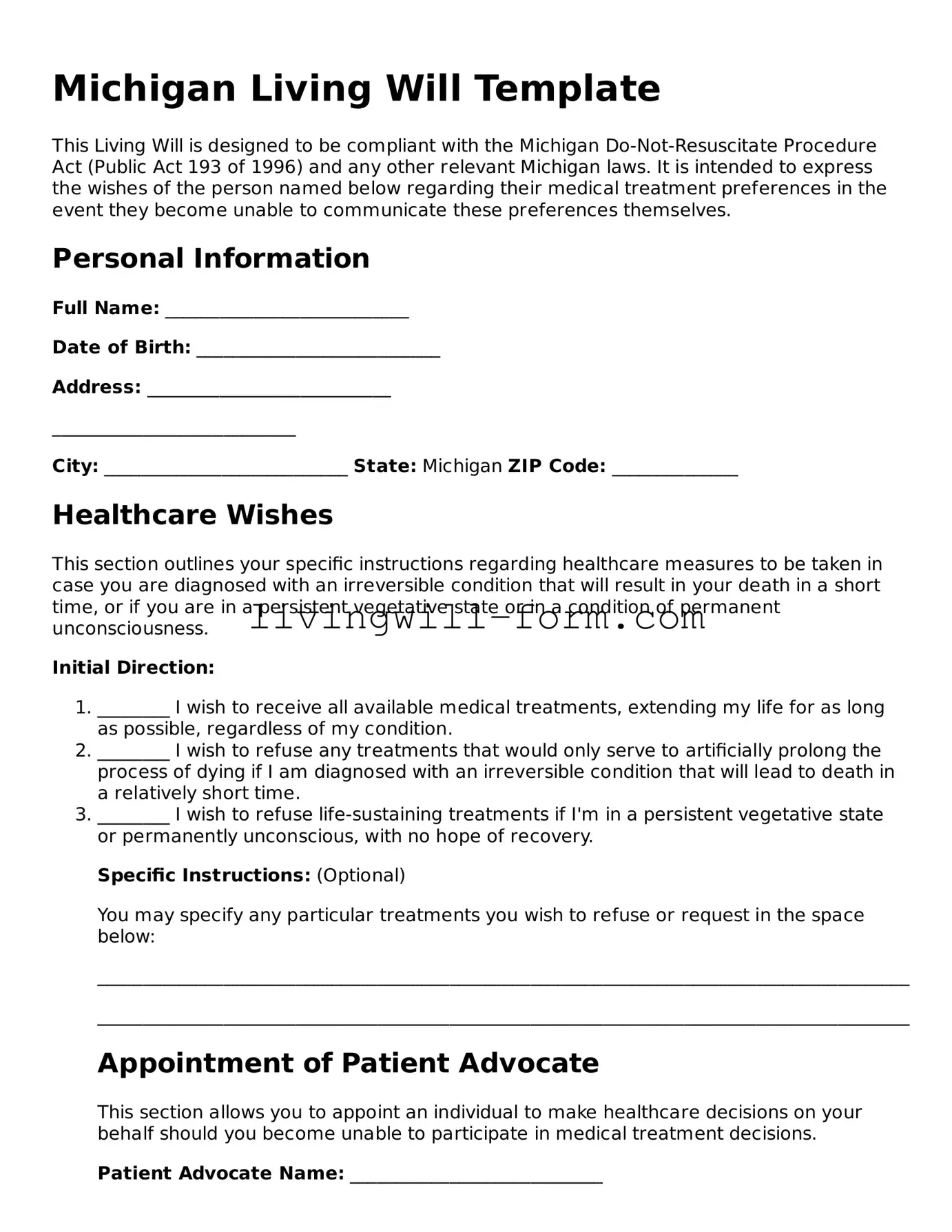A Michigan Living Will is similar to an Advance Directive in other states. This document provides instructions about healthcare wishes if someone becomes unable to communicate because of illness or injury. It specifies types of medical treatments desired or not desired, mirroring the purpose of Advance Directives, which guide healthcare providers on a patient's preferences regarding life-sustaining treatments, resuscitation, and other pivotal healthcare decisions.
The Durable Power of Attorney for Health Care, often used alongside a Living Will, appoints a person (healthcare proxy) to make decisions about medical care if the individual is incapacitated. While a Living Will dictates specific wishes about treatments, the Durable Power of Attorney for Health Care allows the appointed person to make health decisions not specifically covered in the Living Will, providing a broader scope of decision-making power based on unforeseen circumstances.
A Do Not Resuscitate (DNR) Order is another document that echoes elements of a Living Will. It explicitly instructs healthcare providers not to perform CPR if the patient's breathing stops or if the heart stops beating. While a Living Will can contain such instructions, a DNR is a standalone document often used by people with serious illnesses or at the end of life, providing clear, immediate guidance in emergencies.
A POLST (Physician Orders for Life-Sustaining Treatment) form has similarities with a Living Will but goes further by translating a patient’s wishes into medical orders that are immediately actionable by healthcare providers. While a Living Will may express general wishes about end-of-life care, a POLST specifies what types of life-sustaining treatments a patient wants or does not want based on their current medical condition.
Healthcare Surrogate Designations also share common ground with Living Wills. They designate an individual to make healthcare decisions on a person's behalf if they become unable to decide for themselves. While it overlaps with the Durable Power of Attorney for Health Care, a Healthcare Surrogate Designation is specifically intended for medical decisions, reinforcing or complementing the directives in a Living Will.
An Organ Donation Form can be seen as a supplement to a Living Will, as it provides instructions for after death. While a Living Will focuses on the desire for or against life-sustaining treatment before death, an Organ Donation Form records a person's wishes regarding the donation of organs and tissues for transplantation after death, potentially saving or improving others' lives.
A Will, or Last Will and Testament, while primarily dealing with the distribution of a person's estate after death, shares a common intent with a Living Will of ensuring a person's wishes are honored. A Living Will take effects during the person’s lifetime, focusing on healthcare decisions, whereas a Will comes into play after death, dealing with property and guardianship issues.
A Financial Power of Attorney designates someone to handle financial affairs if a person becomes incapacitated. Although it focuses on financial rather than healthcare decisions, it complements a Living Will by ensuring that all aspects of one’s personal affairs can be managed according to their wishes when they are not able to do so themselves.
An Ethical Will is an informal document that allows an individual to share their values, life lessons, and desires for the future with loved ones. Unlike the legal directives of a Living Will, an Ethical Will is more about leaving a personal legacy than making medical decisions. However, both documents reflect an individual's intent and desires beyond their presence or capacity to communicate.
Lastly, a Mental Health Advance Directive is a document that provides instructions for mental health care decisions, such as preferences for psychiatric treatment, medications, hospitalization, and even the choice of a mental health care advocate. While focused on a specific aspect of healthcare, it aligns with the Living Will's purpose of guiding healthcare providers according to a patient’s wishes when they cannot communicate those themselves.

